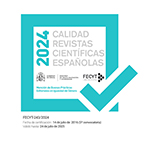Challenges for Social Work Education in a Changing Europe
Resumen
There can be little doubt that neoliberalism has replaced social democracy as the political consensus across Europe and globally. This has led to levels of inequality and relative poverty unprecedented since the post-war social democratic consensus. It has also led to a common sense, neoliberal narrative essential in garnering support for policies that weaken workers’ rights, deregulate corporations and businesses, and cut budgets for welfare and public services. Essentially, the narrative is that people should be completely self-sufficient and that to depend on welfare or the state in any way is a sign of poor character, laziness and of membership of the ‘underclass.’ It is a ‘moralising self-sufficiency’ narrative (Marston, 2013).
Much of social work activity is concentrated in areas of unemployment, poverty and deprivation and what will happen to our values of respect, compassion and care if social workers unquestioningly internalise the above narrative? Maybe a form of authoritarian social work that treats people as ‘less than human’ (Smithson and Gibson, 2016)? Grasso et al (2018) undertook a study using British Attitudes Study data and found that the generation known as ‘Millennials’ were more right-wing authoritarian than all previous generations. What might happen if that trajectory continues? The authoritarian attitudes of our current generation of post-Millennial students, labelled as iGen by Twenge (2018), were studied in one Scottish university and the results will be shared in my talk today. What might the implications be for social work education and are we up to the challenge?
Descargas
Descarga artículo
Licencia
La revista Cuadernos de Trabajo Social, para fomentar el intercambio global del conocimiento, facilita el acceso sin restricciones a sus contenidos desde el momento de su publicación en la presente edición electrónica, y por eso es una revista de acceso abierto. Los originales publicados en esta revista son propiedad de la Universidad Complutense de Madrid y es obligatorio citar su procedencia en cualquier reproducción total o parcial. Todos los contenidos se distribuyen bajo una licencia de uso y distribución Creative Commons Reconocimiento 4.0 (CC BY 4.0). Esta circunstancia ha de hacerse constar expresamente de esta forma cuando sea necesario. Puede consultar la versión informativa y el texto legal de la licencia.









